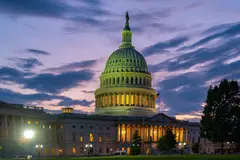US government shutdown puts future of nutrition programs at risk
Key takeaways
- The US government shutdown risks federal nutrition programs like SNAP and WIC, with benefits beyond October uncertain.
- Contingency funds may temporarily cover benefits, but delays could threaten families’ health, especially young children.
- Cuts to nutrition programs and hunger reports make food insecurity less visible and harder to address.

The US government has been shut down for the first time in almost seven years, with the Food Research & Action Center (FRAC) shedding light on what could happen to nutritional assistance. Supplemental Nutrition Assistance Program (SNAP) recipients should receive their October payments, however, the nonprofit warns the future beyond that is unclear.
FRAC Interim SNAP director Gina Plata-Nino says that the current government funding expired on September 30 at midnight. Congress failed to pass the budget bill, and she warns that all programs that rely on annual appropriations will be shut down, putting programs like SNAP at risk.
Job losses
FRAC warns that due to the Antideficiency Act, federal agencies must stop all nonessential functions until Congress acts, leading to the suspension of “nonessential personnel,” as seen in 2018–19, when the last shutdown occurred during US President Donald Trump’s first term.

“If a shutdown extends beyond mid-October, the US Department of Agriculture (USDA) could technically tap its contingency reserve funding to cover SNAP costs,” says Plata-Nino. “Under the prior administration, this reserve stood at US$6 billion, but it is unclear how much remains available or whether the current administration would choose to use it.”
FRAC also explains that under the Trump administration, there is a change compared to previous ones, as the Office of Management and Budget (OMB) has ordered agencies to make plans to permanently eliminate jobs rather than impose temporary furloughs. “OMB director Russ Vought is leveraging the threat of permanent job losses to heighten pressure in the spending standoff with Democrats in Congress.”
Representative Gil Cisneros reacts: “House Republicans canceled the last two workdays on the calendar and extended their vacation. Now, thousands of federal workers will be forced to work without pay, essential services will be paused, and hardworking American families are shoved further into the Republican healthcare crisis.”
“Rather than making life better for the American people, Trump and Congressional Republicans seem hellbent on punishing and making life harder for the American people. But they don’t care. Republicans control the House, the Senate, and the Presidency. Their lack of leadership is disappointing, and the full responsibility of the shutdown is at their feet.”
WIC under risk
Plata-Nino warns that during previous shutdowns, the Special Supplemental Nutrition Program for Women, Infants, and Children (WIC) was able to survive due to early-year funding. “But this time, the fiscal year hasn’t even begun.”
“If the USDA doesn’t give states the green light to begin processing November benefits on time, families could see delays or disruptions in the food assistance they depend on.”
“WIC has a small safety net of leftover funds and a contingency account, but it may not be enough to keep services running at full capacity. Any disruption in benefits for WIC would put the health and well-being of young children and their families at risk,” warns Plata-Nino.
FRAC stresses that the USDA has not provided a 2025 contingency plan.
“If USDA fails to instruct states to transmit the necessary electronic files on time, November SNAP benefits could be delayed or interrupted entirely,” warns FRAC. “Each state operates on its own internal processing schedule to ensure the timely issuance of benefits. If a state misses its deadline to begin that process, delays are almost inevitable, leaving households without access to the food assistance they rely on.”
Turning hunger invisible
Meanwhile, SNAP education programs ended on September 30 under Trump’s One Big Beautiful Bill Act, signed in July. It slashed federal funding for SNAP by US$186 billion through 2034.
Last month, the Trump administration also scrapped the annual USDA Household Food Security Reports, which is an essential tool for tracking hunger in the US.















